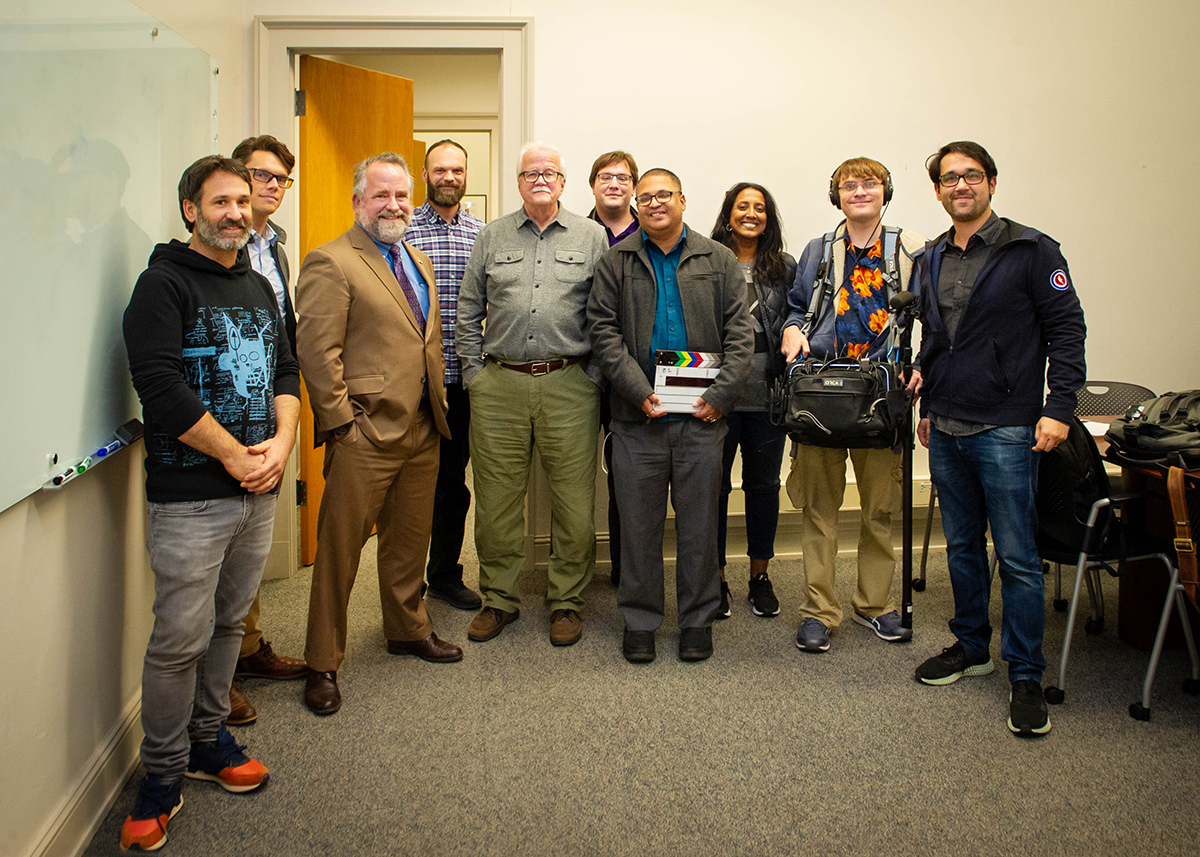LSU Researchers Enter Semifinals for the $5M IBM Watson AI XPRIZE
January 21, 2020
People and pharmaceutical companies around the world are increasingly challenged by antibiotic-resistant bacteria as well as new and rapidly evolving pathogens. The discovery of new drugs, meanwhile, can be a slow and costly process as companies must make sure their drugs are both effective and safe. It currently takes on average 10 years and over $2 billion to create a new drug and get it approved. Now, an interdisciplinary LSU team led by Supratik Mukhopadhyay, associate professor in the Department of Computer Science, and Michal Brylinski, associate professor in the Department of Biological Sciences with a joint appointment in the Center for Computation & Technology, suggests using artificial intelligence, or AI, to try to solve this growing problem.

The XPRIZE team visits LSU, meeting with Vice President of Research & Economic Development Sam Bentley (third from left); Michal Brylinski (fourth from left); attorney Patrick McGrew (fifth from left); Supratik Mukhopadhyay (fourth from right); Roopa Dandamudi, XPRIZE project manager (third from right).
The team, known as Deep Drug, is leveraging deep learning techniques from computer science and vast datasets of known bioactive compounds from biology and chemistry to teach their tool, called eSynth, to invent or pinpoint compounds that should be effective against specific bacteria.
Another aspect is ensuring that the identified compounds are safe. For this purpose, the team is working on an additional module called eToxPred. While clinical toxicological testing of a therapeutic compound to determine safety is time-consuming and expensive, drug companies could use eToxPred to predict which compounds might elicit toxic effects and harm patients. The team is also developing another artificial intelligence-based module called eDrugRes, which allows for examination of the protein-protein interaction network of pathogens to predict susceptibility and/or resistance to known drugs.
The team has so far tested eSynth using 20,408 bioactive compounds for 102 receptor proteins that represent many important drug targets. Deep Drug expects eSynth to reduce the time for preclinical drug discovery and testing from an average of three years to six to eight months.
“This is an opportunity to try to solve a moon-shot problem, a very hard problem,” Mukhopadhyay said. “For this, we needed an interdisciplinary team. When I happened to see one of Michal’s talks, I said, ‘This is the guy I need.’”
Brylinski’s expertise is in computational microbiology and chemistry.
“We’re integrating enormous amounts of biological data and the data is quite complex and difficult to analyze, which is why we need artificial intelligence. Importantly, we’re doing this without any experiments; it’s simply the AI telling us when to synthesize a new drug. If a certain bacterium is drug-resistant, AI can help us find another drug that could be effective. The only input would be the DNA sequence of a pathogen, and then the AI can figure out what will kill it. Instead of subjecting a lot of people to testing, we can just use a computer.”
Michal Brylinski
“I can’t enough emphasize the value of collaboration on this project,” he said. “By myself, I would never be capable of doing something like this, not without AI. At the same time, in order to use AI, computer scientists need to connect with domain scientists to solve real-world problems.”
“This is a large-scale project and something we’ve never done before,” Brylinski continued. “We’re integrating enormous amounts of biological data and the data is quite complex and difficult to analyze, which is why we need artificial intelligence. Importantly, we’re doing this without any experiments; it’s simply the AI telling us when to synthesize a new drug. If a certain bacterium is drug-resistant, AI can help us find another drug that could be effective. The only input would be the DNA sequence of a pathogen, and then the AI can figure out what will kill it. Instead of subjecting a lot of people to testing, we can just use a computer.”
Brylinski compares the team’s use of AI for drug discovery to that of engineers of self-driving cars.
“In cars, the AI gets lots of data from sensors and then has to make decisions about when to stop or when to accelerate,” he said. “We’re doing something very similar. We’re collecting lots of data from experiments to train our AI to be able to make good decisions, whether to synthesize a drug or not, and knowing if a particular drug is going to be effective.”
Computer science graduate student Adam Bess is working with Mukhopadhyay and Brylinski on the Deep Drug project. His undergraduate degree was in both biology and computer science, and he worked for a few years in bioinformatics before coming to LSU last year.
“What I’m the most excited about is creating a toolkit and rich datasets that any researcher can use to do in-depth analysis of different kinds of drugs and bacteria,” Bess said. “Together, we can do more integral science and help each other move this whole project forward.”
The IBM Watson AI XPRIZE is a global competition encouraging teams of researchers to develop powerful applications based on artificial intelligence and demonstrate how humans can collaborate with AIs to tackle some of the world’s greatest challenges. Now a semifinalist, the LSU team will receive a $15,000 milestone award on their way toward the $3 million grand prize, which will be awarded to one of the 10 teams now remaining among the original 147 in 2016. The second and third place teams will receive $1 million and $500,000 respectively.
The top three teams are expected to be announced in February 2020 and present their work at TED2020 in Vancouver, on the theme “Uncharted.”